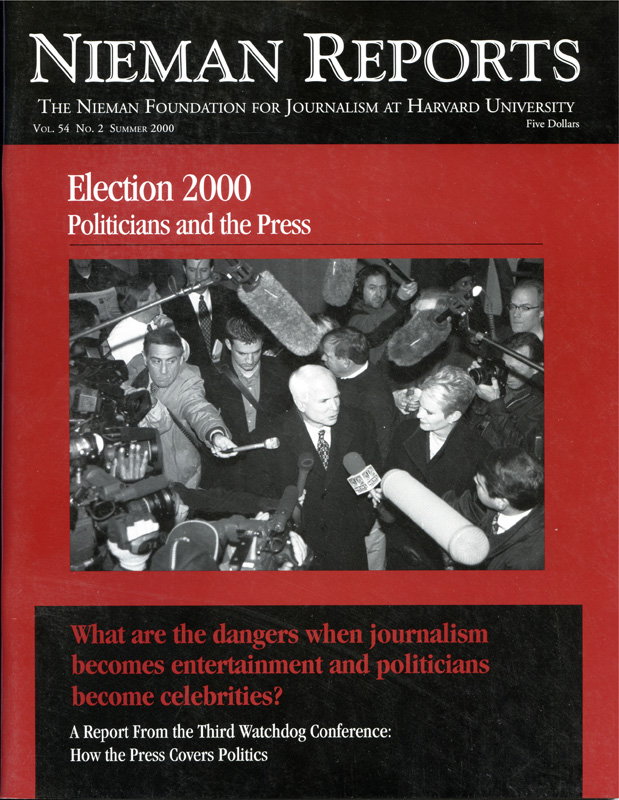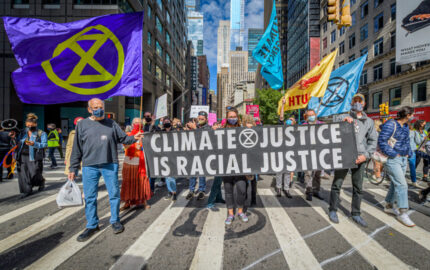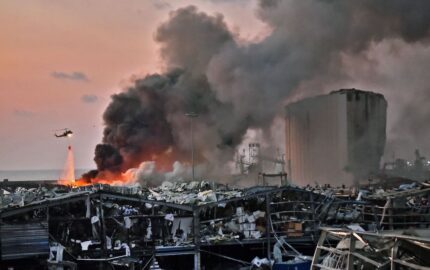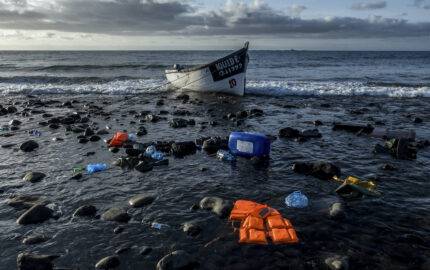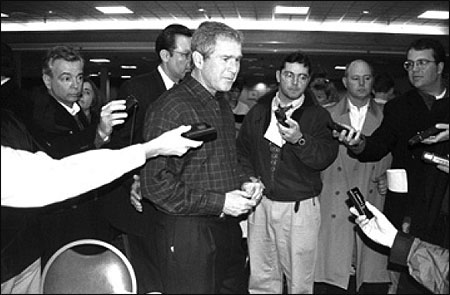
Photo by Francesca Moisin.
Are members of the press asking candidates the right questions? What should those questions be? A number of panelists, including journalists and politicians, had some ideas about specific topics that should be addressed and ways for reporters to do so. Excerpts from these discussions follow.
Ray Suarez, senior correspondent, “The NewsHour with Jim Lehrer,” and panel moderator: “One question that reporters don’t usually ask but are getting an opportunity this morning to ask is, ‘Are we asking the right questions?’ Because it is the reporter’s core belief that he or she is always asking the right questions. So what do you mean [when you say to us], ‘Are we asking the right questions?’ Our interest is the national interest and our service is the public good. If only the people of whom we’re asking the questions would understand that.’…. Who is going to decide what questions get asked next year? Is it the press in response to agendas coming out of the campaign offices? A little of both, or the other way around?”
Lee Hamilton, former congressman from Indiana: “What are the right questions to ask? I put forward two. With regard to foreign policy, every candidate should be pressed on the question of what is the role of America in the world today…. People are interested right now in the question of intervention. When do you intervene? How do you intervene? With what tools? With what kind of support? But this really is the key foreign policy question, and every candidate ought to be pressed on it very, very hard.
“The second question that ought to be asked is the great question of American politics, and that is the question that we have wrestled with since the beginning of the country. What is the role of the government? What is the role of the government in meeting important needs of the people? What is the role of the government in providing opportunity for people? What is the role of the government in reflecting the core values of our society? What is the role of the government in curbing the excesses of the marketplace? If you want to understand a candidate, you want to understand how that candidate views the role of the government in American society today.
“The final comment I’d make is that health care bubbles and seethes beneath the surface of all recent political campaigns. It may or may not become the breakout issue in the year 2000. I don’t know. But I certainly see it as a very, very important issue.”
Geneva Overholser, columnist, Washington Post Writers Group: “I think that one of the questions we need to think about is not only what questions are we asking and what issues are we sure are being raised, but what is the tone of our coverage on all those questions and all those issues. In the seven years I was editor of The Des Moines Register, in the three years I was Ombudsman at the Post, and now as a columnist, when I write about media issues I am struck continually by how powerfully readers feel and viewers feel that we are often out to get somebody and often out to drag down the process. We have all kinds of reasons why we understand that we’ve got to do unpopular things. But I think it is very easy to brush off the powerful feeling that the public has that we’re in fact doing more to harm our democracy than we are to assist it.
“And it’s something we ought to pay more careful attention to, whether we’re talking about personal coverage or issue coverage. I think people are very much interested in individual candidates, in their character, in their personal lives. And I think we’re well advised to do the kinds of profiles we do, even the lengthy ones that we tend to laugh at among one another. Did you see that seven-part eye burner on George W. Bush? But that kind of coverage [is good] as opposed to the kind of an incessant, ‘Did George W. Bush ever snort cocaine?’, the question that dogs him on the campaign when, in fact, we’re the ones who are dogging him on the campaign. And the public is getting this. We are not hiding this from the public.
“Or when we’re covering issues with the kind of lead that says, ‘In a desperate attempt to save his faltering campaign today, Al Gore does this and that.’ I think that this kind of coverage is not only putting people off the political process but holding up an inaccurate mirror and putting people off the media. So it doesn’t serve us terribly well…. One of my favorite comments when I was Ombudsman of The Washington Post was from a fellow who said to me, ‘Could you just give us the facts? I can supply the cynicism.’ I think it’s something we all ought to keep in mind.”
Bill Kovach, Nieman Foundation Curator: “One of the most important questions that needs to be asked is the one that journalists ask of themselves: Are they asking themselves the right question about how they cover campaigns and how they deal with the issues that should inform a national election? Former Congressman Dan Rostenkowski, who has had a number of reasons to pay a lot of attention to the way the press covers politicians and politics, made an observation that I think describes the situation very well. He says that what most journalists do not understand is that the public tends to see all public institutions as sort of similar to one another. The more the press writes about politicians and politics as a corrupt and ineffective public institution, the more the public begins to see the press as an ineffective and perhaps corrupt institution. That’s one of the questions we should be asking ourselves. How is our performance not only shaping the agenda of a political campaign but shaping the agenda of how the public looks at journalists and the press and their role in American society?”
At one point during the conference, several commentators went back and forth on this topic.
Judy Woodruff, Anchor and senior correspondent, CNN, and moderator of one panel: “There are very real questions again in this presidential campaign about whether we’re doing the right job and whether we’re asking the right questions and whether we’re representing the people we write for and report for, the public, as well as we should…. But I think that all of us, no matter which direction we come from, whether we’re in television or whether we’re in print, we do sense that there’s something about the system that needs fixing whatever our perspective is.”
Susan Page, White House Bureau Chief, USA Today: “But you know, Judy, Sheila Tate said that it’s up to the press to decide when these [personal] questions get raised. But there is no press to decide. The fact is that even if The Washington Post and The Atlantic and the National Journal and USA Today decided there was a certain sort of question we weren’t going to ask, it wouldn’t matter. Because Matt Drudge would ask it and talk radio would ask it. And the world of the news media has gotten so that it is not possible for the press to decide not to pursue these questions.
“What I think really has happened is that the public has decided what they are going to discount as issues. We’ve certainly seen this over and over again with President Clinton where there are issues that we [in the press] see as character issues and explore in great depth and even through impeachment. And the public decided these were not the issues that mattered to them, and they were going to dis them. And that seems to me the reality of the world we’re in now. Candidates can choose not to answer questions, and some reporters can choose not to ask them. But at the end it’s in the power of the public to decide whether the questions and the answers matter.”
Michael Kelly, Editor in Chief, National Journal [now also Editor of The Atlantic Monthly]: “I don’t have any complaint with asking specific questions or tough questions. It is of some concern to me, I think, that when you go down this road, and we saw this with the experiment in the last cycle of civic journalism in, I think it was North Carolina. You get into an area where it becomes an obvious question whether or not it is the press’s duty and the press’s privilege to decide what the candidate should be running on and what are appropriate and what are inappropriate platforms with which to appeal to voters. I sort of feel that any candidate should be able to run on whatever platform or whatever set of issues that that candidate chooses, including if he chooses to be demagogic.”
Judy Woodruff: “So if they want to ignore the savings and loan crisis [that’s okay]?”
Michael Kelly: “If they want to ignore it, let them…. And if a reporter wants to haul them up on it, let them. But I get nervous about a prescriptive set of 10 or 20 questions that we’re going to ask every candidate. Because then what we’re saying is this is what we have decided are the important issues. And I’m not sure where we got that right.”
David Broder, columnist, The Washington Post: “There’s some variant I think is useful and that we don’t do very often. Which is simply to ask factual questions of candidates.”
Judy Woodruff: “You mean, ‘How do you know about ____?,’ those kinds of questions?”
David Broder: “Yeah. I did this on ‘Meet the Press’ with then-Vice President Bush and got thoroughly reamed by Barbara Bush. I asked , ‘How many Americans do you think don’t have health insurance today?’ It’s useful to know what their picture of reality is in the country that they’re attempting to govern.”
In his comments closing the conference, former Washington Post reporter Murrey Marder came up with a few more questions of his own. “Sitting here and listening to this discussion, I was compelled to think that I could think of a couple more questions that were not asked, which I would like to mention now. Which I think illustrates the possibility that as intensely as we all think we have asked questions, often the most obvious questions never do get asked.
“Some of you will recall that one of the simplest but most penetrating questions for a presidential candidate was once asked by Roger Mudd in questioning Senator Ted Kennedy on live television. It was, ‘Why do you want to be President?’ For moments there was dead silence. The Senator was unprepared for an elementary question and too confounded to improvise. His campaign was devastated right at the outset. I think we should be asking that question again. That basic question. I would certainly like to know from each candidate, to explain in two or three minutes exactly why he or she, of course, wants to be President.
“A related question could be based on the practice of describing the occupant of the White House as leader of the Western world. This honorific title came out of the Cold War when American nuclear weapons could determine whether many nations would live or die. Today many people of the Western alliance remain very conscious that their fate can still be decided in the White House. If they could ask, I think they certainly want to ask the presidential candidates what I think is about the most humbling question you can ask anybody: ‘What qualifies you to be the leader of the Western world?’ I would love to hear the answers to that question.
“I also would want to know from each candidate, before making any commitment to send U.S. troops abroad, would the candidate as President pledge to give the American public in advance a full explanation of the pros and cons of the intended troop deployment? I certainly wish that question would have been asked by the press seriously before all of the recent troop commitments abroad, notably in Kosovo. And what is the purpose of freedom of information so far as the American government is concerned? Is he or she prepared for open government and also prepared to seek declassification of the mountains of information withheld from the public on grounds of secrecy decades after any valid reason for secrecy?
“Lastly, as we pile up questions to challenge or stump the candidates we should not, in our zeal to question others, forget that there are also questions that all of us in the print and broadcast press should be asking ourselves. At the end of the day the voters who cast ballots and those who do not are not voting only for candidates for office. They are also casting ballots or not casting ballots, as the case may be, which express their interest in and their share in our political system. And we in the press have as much of a stake in this system as any candidate does. For if we do not help to explain it accurately, fairly and compellingly, the system cannot sustain itself. For this democracy is participatory in the most literal sense. If we don’t participate it fails. So the stake is as simple as that.”
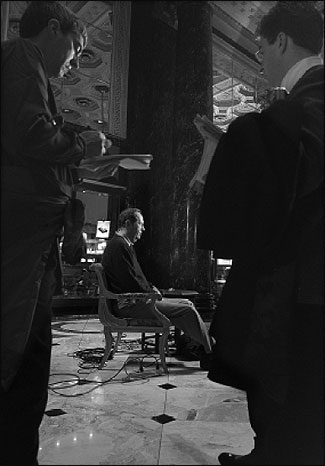
Photo by Nicole Bengiveno/NYT Pictures.
